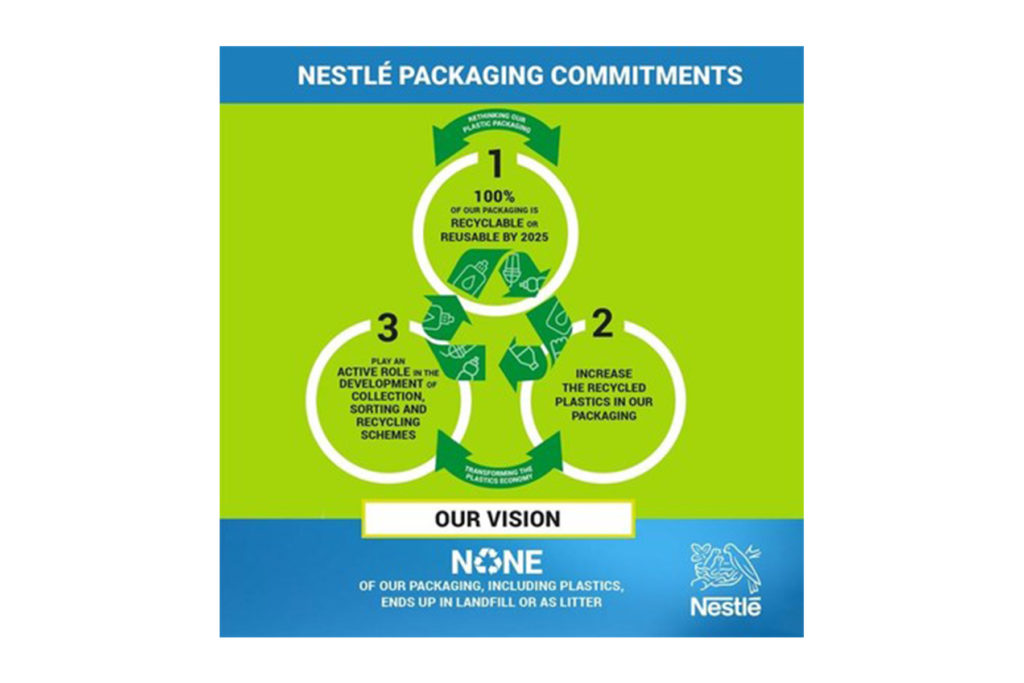With sustainability being a top concern for millennials, who are currently the largest working consumer demographic in the US, major food companies have been seen launching sustainability initiatives for the production of their products. Following this trend, Nestlé has announced a new sustainability program in which the company plans on using 100 percent recyclable or reusable packaging by 2025.
“Plastic waste is one of the biggest sustainability issues the world is facing today. Tackling it requires a collective approach. We are committed to finding improved solutions to reduce, re-use and recycle. Our ambition is to achieve 100% recyclable or reusable packaging by 2025,” Nestlé’s CEO Mark Schneider said in a release.
Nestlé’s sustainability initiative incorporates three main steps: the elimination of non-recyclable plastics, the incorporation of plastics that have better recycling rates and the elimination of complex combinations of packaging materials. In addition to these three steps, the company claims that they will be actively participating in and improving the collection, sorting and recycling of plastics in the countries that they operate. All their new packaging materials will have recycling information on them to inform consumers on how to properly dispose of them.
According to Nestlé, one of the main reasons why they are developing this new sustainability program is to prevent packaging waste accumulation in seas, oceans and waterways. This is a good promise to make to eco-friendly millennials, especially considering that eight million tons of plastic waste is dumped into the world’s oceans every year.
This new sustainability program comes after the major CPG company announced their partnership with Danone and Origin Materials, a California-based start-up, in the formation of the NaturALL Bottle Alliance in 2017. This alliance focuses on the development and future commercial launch of 100-percent bio-based polyethylene terephthalate (PET) bottles for the food and beverage industry. Currently, most PET plastic bottles are made from 30 percent bio-based materials; once these new 100 percent bio-based bottles are developed, food companies can easily reduce their environmental footprints by using these bio-based bottles for packaging their products.
Nestlé is not the only major food company investing in sustainability. Earlier this year, fast-food giant McDonalds announced a similar sustainability initiative in which they plan on using 100 percent sustainable packaging by 2025. In March, ReGrained, a start-up nutrition bar company, launched a line of completely sustainable energy bars made from upcycled ingredients and packaged in fully compostable material. Dutch grocery chain, Ekoplaza, made history this year with the launch of the first plastic free grocery aisle in an Amsterdam location. Ekoplaza’s huge step towards sustainability led American consumers to start a petition for Kroger to adopt a plastic free aisle in their stores as well.
This demand for sustainability comes from what market research organizations call “the most value-driven consumer market” the food industry has ever faced. As millennials continue to dominate this consumer demographic, food companies need to appeal to their preferences as well as their values in order to boost sales. However, sustainable packaging is not the only thing that millennials want to see in a food product. Sustainable practices can be incorporated in all aspects of the food production process, from sourcing and manufacturing, to packaging and distribution. The more a food company integrates sustainable and ethical practices in their facilities, the more likely they are to attract millennial consumers.











Join or login to leave a comment
JOIN LOGIN